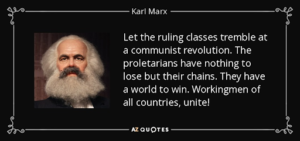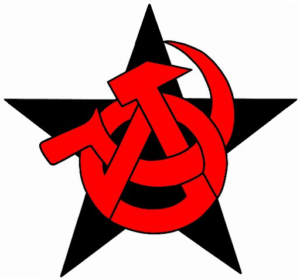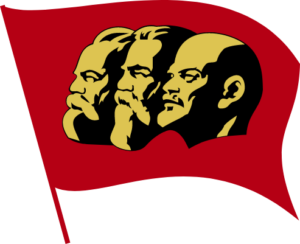What is Communism?
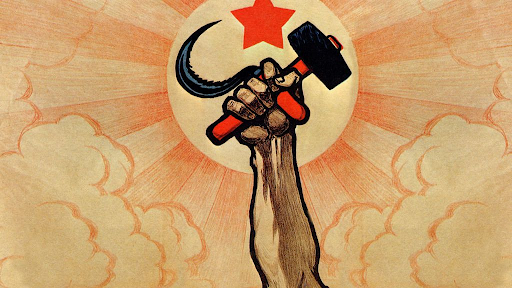
Source: Getty Images
May 1, 2022
Communism is When No iPhone
A tyrannical dictator, scary government agents in suits and sunglasses, no free choice, happiness is scarce, and, most importantly, no iPhones. This is the reality of Communism, or so most Americans think.
Communism is nothing like what most Americans are conditioned to believe it is. It’s not China; it’s not the Soviet Union; it’s not any country that calls itself communist. Every country that has categorized itself as communist would be called state capitalist (i.e., a political system in which the state has control of production and the use of capital).
Some may ask, “Then why do they call themselves communists?” Just because someone calls themselves something doesn’t make it accurate. North Korea calls itself a democratic republic, that doesn’t make it true. It takes no more than one sentence to debunk the idea of China and the USSR being communist countries. Communism is a stateless, classless, moneyless society. As long as China and the Soviet Union have a class system, money, and government, they cannot be considered communists.
In a more thorough explanation, communism is an economic system where the workers own the means of production and property is community-owned.
If you’ve learned about communism in school, there’s a high chance you haven’t learned about communism at all. My goal with this article is to teach people about an alternative to capitalism without all the Cold War propaganda and misinformation in as simple terms as possible.
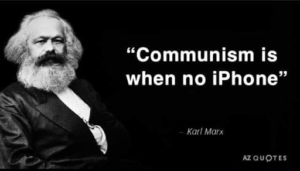
What Do Communists Want?
The Communist agenda can be boiled down to a few main points:
- The abolition of private property
- The abolition of inheritance
- The abolition of social/economic classes
- The centralization of communication and transportation
- To seize the means of production; to have them be worker-owned and operated with equal shares and no head boss
- To establish a free education system
What does all of this mean? Some of it is as simple as it sounds; establishing a free education system is precisely that; centralizing communication and transportation is exactly as it sounds. The trickery ones, abolishing private property and inheritance, are easily understood once explained.
Private property does not consist of your iPhone, computer, toothbrush, or even your house. This is considered personal property. Private property is literally just property owned by private parties.
For example, an apartment complex is considered private property because it’s a building owned by one person, the landlord, who makes money simply by capitalizing on others’ needs to live. Private property is a company building and everything inside, including the machinery and the means of production.
The problem with private property is that it creates a fundamental imbalance between the workers, who don’t see the fruits of their labor, and the elites, who reap all the benefits of the workers’ effort. Private property creates the environment needed for exploitation. For one person to own the means of production is to inherently own other people’s lives.
The abolition of inheritance makes more sense once you understand that money doesn’t exist in a communist society. This goal minimizes what someone could inherit, if anything at all. The abolition of inheritance is found in the idea that all property can be better used for the good of society instead of just one person. This idea ties back to Marx’s quote, “from each according to his ability to each according to his needs.”
Humans are naturally compassionate, social, and giving creatures. It’s in our nature to share what we have with others. Communism is just a heightened version of that, where everyone’s needs are satisfied, and no one person owns an apartment complex while the people who live there barely afford to make rent.
Communists want a society free from exploitation, the way to get there is by removing the factors that led to this corruption in the first place.
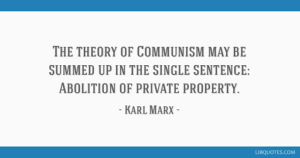
Different Types of Communism
There’s a lot of discourse within the communist community surrounding the transitional period, i.e., the question of how we actually get to the end goal of a stateless, classless, and moneyless society. This transitional period is known as socialism.
This brings us to our next topic, the different types of communists. This phrase is slightly misleading, as the end goal of communism has never been defined as anything past being stateless, classless, and moneyless. Karl Marx wrote that the outcome of communism depends entirely on the material conditions at the time, so it would reshape and mold itself to fit what is needed at the time. This means that these ‘different types of communists’ are just different socialists. Still, nobody actually refers to them as different forms of socialism, so I will continue to call them different types of communists. The arguments arise from people having different ideas on the best way to transition from capitalism to communism.
There are many kinds of communists, but they can all be categorized under two groups:
Anarcho-Communism:
Anarcho-Communism (abbreviated as ancom) is the belief that the transition to communism must not be government-assisted, and everything needs to be collectively done by the people. Prominent ancoms would be the Zapatistas, George Orwell, and Karl Marx.
Marxism-Leninism:
Marxism-Leninism (abbreviated as ML) is the belief that the path to communism has to be exceptionally well organized and led by the state. Prominent MLs would be the early Soviet Union, Cuba’s Fidel Castro, and China’s Mao Zedong.
Essentially, the different ideas held by communists can be seen on a spectrum from authoritarian to anarchist, with Marxism-Leninism falling on the authoritarian side and Anarcho-Communism falling on the anarchist side.
These definitions are boiled down to the bare bones for an easier and more digestible understanding; for a more in-depth explanation for the ancom ideology, click here, and for the ML ideology, click here.
What Communism is Not
Few other concepts or ideologies have been as heavily demonized and misrepresented as communism. Americans treat it as a dirty word reserved for anyone they don’t like. Socialism is not communism. Marxism is not communism, and, as stated before, Russia, China, and North Korea are not examples of communism.
Socialism is a broad term used to describe the transitional period from capitalism to communism. Marxism is simply a way to look at history. Marxism is the belief that you can look at all of history and view it as one big class struggle, nothing more and nothing less (see the Karl Marx quote, “The history of all hitherto existing society is the history of class struggles”). It’s not an economic or governmental system, and it’s certainly not American Democrats, not even Bernie Sanders. It’s literally just a way of understanding world history. So next time you hear a Republican call something or someone Marxist, now you know they have no idea what they’re talking about and are just using a buzzword for attention.
Communism is not a dictatorship. Government as we know it wouldn’t even exist under communism. Governments don’t belong in communism because there will always be someone above another; there will always be a power imbalance.
Most misconceptions about communism are just a distorted version of what communists actually want.
Communists want to abolish freedom? More like the freedom to exploit people however corporations see fit. Communists aim to destroy countries? The working class has no country; a country’s only purpose is to keep us divided. Communists want to steal others’ money? This one is pretty accurate, but it’s more like stealing it back. Why should the elites see the fruits of the working class’s labor? Communism doesn’t work? Actually, it does. Native Americans lived under communism long before Karl Marx wrote The Communist Manifesto and long before we stepped foot on this continent.
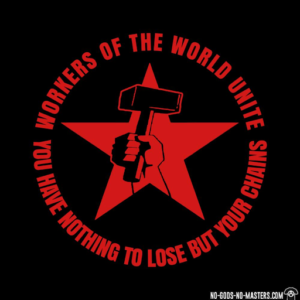
Where to Start
While most people want to start with Marx when first getting into theory, I advise looking elsewhere. Marx’s work is often difficult to understand. The Manifesto itself contains points that are very relative to his time. To understand the Manifesto, you would have to be familiar with German history and the socio-economic and political environment of the time. The Communist Manifesto is a classic read, but it’s dated information that is difficult to relate to today’s times. Read it eventually, but don’t start with it.
A great author to begin with is Angela Davis. Black Panther, prison abolitionist, outspoken feminist, and phenomenal author. As a black woman, Davis offers new perspectives on the subject of communism, perspectives foreign to Marx. Davis is still alive and continues to publish books, all in digestible terms on topics still affecting us today.
There are also a plethora of resources available online. Marxists.org, The Anarchist Library, Communist Party of the United States, Jacobin Magazine, and the World Socialist WebSite to name a few. This doesn’t include many Instagram and Twitter pages available as well.
The most important part of communism is helping your community. Find out how you can make small-scale changes. Check up on homeless people and ask what you can do to help them, talk to your coworkers about forming a union, and prioritize yourself over your job. All relatively small tasks that work toward a communist society.
My hope with this article is that whoever reads it walks away with a better understanding of what communism is, and maybe that I’ve found a few comrades along the way.
